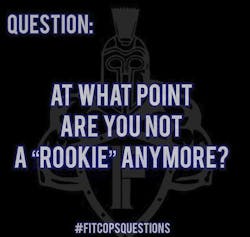This morning as I sorted through my various social media feeds, I came across this question on InstaGram and it was posted by one of our contributors: KP@Fitcops. The question is: At what point are you not a “rookie” anymore? I typed my own response out and will get to it later in this blog, but there were already over 140 comments on the post and I had to read through some of them. It was… entertaining and educational. Interestingly, you could almost guess the number of years-of-service the person posting had behind them.
For the record: as I type this, I’ve got (gasp) 36.5 years of service in uniform. That counts my time as a Military Policeman as well as my time with the “civilian” police force. I’ve served in patrol, SWAT, training, investigations and admin. I’ve been everything from the dumbest boot rookie (well, maybe not THE dumbest) to the Deputy Chief. I’ve served as a consultant for several Chiefs of Police as they’ve worked policy and handled various crisis situations and I’ve served as a consultant to at least three different police psychologists as they tried to gain insight into how things work at various sized agencies. I think it’s safe to say… I’m no longer a rookie. That said, if I were to go back to the street today, I would most certainly see myself as a rookie. How can that be?
Well, part of being a rookie is pure experience, but part of being a rookie is pure competence. While I have a vast body of experience to pull from, my competence with some of the tools in today’s patrol world is not what it would need to be for me to function 100% independent of assistance or oversight. If that doesn’t make me a rookie, I don’t know what would. Keeping that in mind, let’s go through some of the responses (and I won’t cite who posted them) on KP’s InstaGram initiated question and see what we can learn.
QUESTION: At what point are you not a “rookie” anymore?
Reply: When you don’t find this sh*t so fun all the time anymore.
Isn’t that the truth!? Do you remember how excited you were most of the time in the academy? Do you remember how great it was to graduate? Do you remember that fantastic feeling and excitement when you reported for your first shift? Ready to conquer the world and be a hero that helped everyone? Yeah… when was the last time you felt all that? It probably ended about…. The same time you were no longer a rookie.
Reply: When you stop making self-initiated stops in the rain at least two hours prior to your shift ending.
Yep. I remember being so hungry for every “stat” I could get that I’d be pulling traffic and hoping for an arrest five minutes before my shift was supposed to end. And then I remember not wanting to initiate anything in that last couple hours because I wanted to go home when my shift was SUPPOSED to end and not when I was done with all the paperwork, the perp had been processed, the commissioner had rendered bail or… well, you get the point. Rookies are hungrier than veterans. When the hunger wears off, it’s a sign you’re no longer such a rookie.
Reply: When you want to find your quiet spot and just be left alone. Getting calls annoys you, your uniform annoys you, everyone is annoying because you’re always exhausted and you just start counting days until retirement.
Hmm… I guess this can be true but if this is your outlook in the early part of your career, maybe you should find different work. I am NOT being critical, but I hate to see someone SO unhappy for an entire career. On the other hand… this probably describes half the officers I knew who had passed the 15-year mark on the job. They were well past rookie-hood by then.
Reply: When you know WTF you’re doing. I deal with 20 year rookies. How do you not know what to do after 20 years?
There is MUCH truth in this reply. As I said earlier, competence is a big part of not being a rookie anymore. I knew a guy who had been on the force over 30 years, had never made it past corporal and didn’t know how to do much beyond write traffic tickets and make simple drug arrests. Yet that same guy acted like he knew everything because he’d been around so long and he definitely acted like everyone owed him something due to his number of years on the force. That leads me into the next reply…
Reply: Stay a rookie. Always learn and stay motivated to work like rookies do. Don’t be lazy. It seems when a lot of people aren’t rookies anymore they feel entitled and start getting lazy.
Yep. That reply hits the nail on the head even if we don’t like to admit it. That 30+ year corporal I mentioned knew it all and had been there done that for everything. He could school seasoned homicide investigators in how to do their job better… but he’d never worked investigations himself. No one… NONE OF US knows it all. There is always something to be learned and the moment you think there isn’t you’ve done yourself – and those around you – a disservice.
Reply: After you’ve been through your first dealings with internal affairs and come out the other side having learned anything of value.
Dealing with IA is definitely educational. It can make a rookie feel targeted, microscopically examined, and so much more. It’s often the first time a rookie’s integrity is questioned along with their honor, ethics and everything that goes with being true to themselves while balancing that against being true to the Thin Blue Line. If you’ve been in the ugly sh*t with IA… you’re no longer a rookie.
Reply: When you find yourself getting phone calls on your day off from your younger coworkers asking how to do something because they don’t want to talk to the sergeant.
Isn’t that the truth. If you’ve become a trusted resource for your fellow officers, you’ve surpassed rookie status. The cool part of this is that once you reach this position, the sergeants (and the rest of the command staff) see it, recognize it and will start to leverage you if you’re not careful. Be the resource but don’t let yourself be used for an agenda.
Reply: When you’re on your third dead body call in a row and all you can think about is Panda Express.
I had to laugh out loud when I read that one, but then I stopped and thought about it. Yeah… when you’ve become so emotionally hardened that dead bodies no longer affect your appetite or impact you emotionally, you’ve passed out of rookie status. While this is a necessity for us to insulate ourselves emotionally from the ugly side of the job, it’s also a sadness that we seem to pay a price with a piece of our humanity.
Reply: I’d say it’s when you have had your “moment,” and we all know what our own “moment” is.
There is some insight and wisdom here. For almost every officer I know there was a defining moment; that moment when something happened to them on the job that passed them out of rookie status. It was the moment when, no matter what another officer said to them, no matter how veteran that officer was, they knew it either didn’t matter or was meant in jest. There is a moment like that in every law enforcement career and if you’re real lucky, you probably don’t remember it.
Now… I could go on. There were over 140 replies and the most common response was “after five years, you’re no longer a rookie.” I’m going to disagree simply because, as I said, I know a guy who had over 30 years on and I still looked at him as a rookie. He just didn’t know how to handle things a veteran officer should know how to handle. And that brings me to my next point: If you’re no longer a rookie, does that mean you’re a veteran?
While we might instinctively say no, the answer has to be yes. Think about it: You’re no longer a rookie when you’ve seen enough sh*t and handled enough calls that nothing much surprises you anymore and you don’t call on the sergeant for help. If you’re on FTO, you’re still a rookie. If you’re off FTO but still not sure about how to handle some things, you’re still a rookie. Sure, we all need guidance or advice from someone who has more experience in some particular functions, but in general… if you just handle your calls and know what you’re doing, then you’ve passed out of rookie status.
Now I want to share what my personal response was for that question. Think about these things… I mean them in all seriousness.
After you’ve written your first fatal motor vehicle accident with a child involved… you’re not a rookie anymore.
After you’ve had to call social services to respond for a child because of abuse, neglect, molestation, etc… you’re not a rookie anymore.
After you’ve been to the emergency room for treatment, with your arrestee handcuffed to the next bed over… you’re not a rookie anymore.
After your first call in to the Chief’s office to answer for why you did something that SEEMED morally questionable but was totally justified in the moment and by the circumstances… you’re not a rookie anymore.
After your first shooting - which if you’re lucky never happens, but I know a couple guys who were in their first shooting within six months of graduating the academy. By the time you’ve dealt with all of the agency return-to-duty requirements, the investigation, the moral questions, the emotional impact, the potential guilt, etc. After all of that… you’re not a rookie anymore.
After you’ve worked a shift wherein something happened that was so impactful you get home later and are just happy to have made it home alive… you’re not a rookie anymore.
After you’ve held another officer who is in tears and you’re fighting them back yourself because you’ve lost a brother/sister cop in the line of duty from your academy class… you’re not a rookie anymore.
After you’ve been betrayed by a “brother” officer whose betrayal was motivated by a desire for rank, power, position, etc… you’re not a rookie anymore.
That’s eight items… pick any two. If you’ve experienced them, you’re not a rookie anymore in my book… but I’ll add another condition: After you’ve been on the agency long enough, with enough variety of experiences to be mentoring a rookie… you’re not a rookie anymore.
All comments, thoughts, additions, corrections, etc are welcome.
Stay safe.



